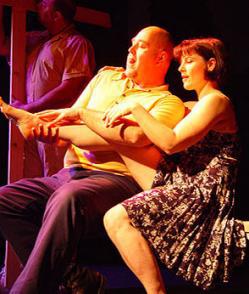Getting a play in a book is a bit like getting a backstage pass: What you see is not nearly as glamorous as you might have imagined. Every year, scores of plays are published in book form. Most come from specialized publishers like Samuel French or Playscripts, whose target audiences are mostly theater companies planning to produce the works. But a handful of important modern plays are published each year by academic and trade presses, and they’re intended for … whom? People, somewhere, who just enjoy reading drama. And the number of people for whom that is true is pitifully small: according to Nielsen BookScan, which tracks about 75 percent of print sales nationwide, the three Tony nominees for best play currently available—Clybourne Park, Other Desert Cities, and Venus in Fur, all in stores six months or more—have sold a total of 7,400 copies.
But many times, plays as books are all we have to go on. The novelist Denis Johnson wrote a half-dozen plays from 2000 to 2010, as the playwright in residence at the Campo Santo theater company in San Francisco, and this month two of them arrive as a book. Soul of a Whore and Purvis: Two Plays in Verse comprises Johnson’s third- and fifth-ever attempts at playwriting, but his enthusiasm for experimentation is present and overriding, and it reads vividly. It also reads long. Jesus’ Son, Johnson’s much-loved 1992 collection of short stories, is a fleet 133 pages; his 2007 National Book Award-winning novel Tree of Smoke wears its 701 pages lightly. The 227 pages of this book, spread as they are between the two plays, go slowly. (To put that in perspective, my old Pelican Shakespeare unabridged Hamlet clocks in at 148, including footnotes.)
One reason Johnson’s longtime publisher might release his plays as a book is if they cast new light on his previous work. Two Plays is a recognizably Johnsonian book in some ways. His characters are outlaws, troubled anti-heroes; the dialogue couches existential anxiety in grunted curses; the scenes are long; the action is violent, both physically and spiritually. An ex-con ambles into a Greyhound station at the beginning of Soul of a Whore, for instance, singing an old folk song: “Let the Midnight Special/ Shine a ever-lovin’ light on you.” He buys a ticket, eavesdrops on a woman on the payphone, then announces, “Man get crazy when his bus don’t come.” The woman quotes Lead Belly back at him: “You ever get to Houston,/ Boy, you better walk right.” The exchange, mostly blues lyrics, is loud but empty, with the space between the words free of the writer’s voice. But in his other books, Johnson the novelist finds reverential moments of quiet that give the lie to all the noise and chaos. In Tree of Smoke, for instance, a character boards a jalopy in the Philippines in a similarly mundane scene—but Johnson describes the event with such beauty: the thing “budging forward by some supernatural force, drifting hugely out of town, like a greasy, sweaty, iceberg—of what use brakes against such inexorableness?” Narration is not typically a tool in the playwright’s toolbox, however, and Two Plays barrels forward with little sympathy.
Soul of a Whore is, remarkably, more delicate than Purvis. Purvis is Melvin Purvis, head of the Chicago office of the Federal Division of Investigation, who collared or killed Baby Face Nelson, Pretty Boy Floyd, and John Dillinger in a six-month spree in early 1934. J. Edgar Hoover fired him not long after, is about all the rest of what’s known for certain. Everything else, from the circumstances of the arrests (did he order the cops to shoot a wounded Baby Face?) to the reason for his firing (Hoover’s jealous paranoia or improper conduct in the field?) to his death (by his own hand, certainly, but suicide or accident?) is called into question. From an author who frequently evokes God (“tree of smoke” is a reference to the Book of Joel), Purvis is uncommonly cynical. Soul of a Whore is more reminiscent of Johnson’s fiction, and involves a con-man preacher, prison, a hooker, her pimp, a roadside dive called the Big-As-Texas topless lounge, a hostage-taker, that Greyhound bus station, an executioner, a demon, and God. It closes with an impassioned speech in support of capital punishment.
Both plays are written in blank verse, the regular rhythms standing in for either the hand of the author or the hand of God, depending on how you look at it. But whereas in Johnson’s novels he can affect our reading directly, in the plays all he has is character, scene, and action—out of that, all the rest has to grow, and he plants the seeds as he writes along. You read a play looking for those seeds and trying to cultivate them at the same time. Being only one person with finite capabilities, you’ll find some bargaining has to take place. Which seeds will I sacrifice? Which nuances will I inevitably miss? Reading Two Plays, the characters in my head spoke all in the same voice; furthermore, I can’t say with confidence that I noted in every instance exactly who was speaking—I sacrificed precision for flow. There were no dramatic pauses in the dialogue, no changes in tempo, few changes in pitch or volume—I sacrificed interpretation for comprehension.

Author Denis Johnson.
Photo by Cindy Johnson.
Most every time I’ve read a play, it was the beginning of a process. Maybe reading the play was a prelude to writing a paper about it. During the period of my life when I was convinced that the theater was my calling, I read plays in order to prepare to direct or act in them. But either way, the experience itself wasn’t complete and wasn’t supposed to be, as a novel is. When you read a novel you’re the audience, with the author the director. You buy your ticket and see the work whole. When you read a play, though, you can read it close up, like an actor, or far away, like a director, but you can’t do both, at least not at the same time. You pick a focal depth and stick to it. A play in production resolves those two depths by the director working with the actors in the rehearsal process; what you see on stage is the result.
This year the Pulitzer committee for drama gave the prize to a play that none of the committee members saw staged, Quiara Alegría Hudes’ Water by the Spoonful. As the Times’ Eric Grode notes, the last time such a thing happened, John Lahr wrote that the situation was “as absurd as giving a restaurant four stars on the basis of its menu.” Writes Grode: “Couldn’t an argument be made that judging the merits of a play is more accurate, not less, when the middlemen and -women are cut out?” There could, of course. A staging is an interpretation, and any audience is subject to whatever kind of interpretation is being rendered: in the mouths of bad actors, a play is bad; under the direction of a bad director, a play is bad. If you want the pure experience of a play as a literary work, goes the argument, you have no choice but to read.
As Dwight Garner once suggested, I invited five friends over to my apartment, bribed them with micheladas, and handed out copies of Johnson’s plays. How might the experience differ? First and foremost, it was a tremendous relief. Reading the plays to myself had been a deeply anxious experience: Every page, as I worked to cultivate those seeds, I wondered about which ones I was missing, and whether I wasn’t picking the wrong ones. Perhaps I wasn’t reading it correctly? Had I missed a key detail of character as I tried to puzzle out a thorny plot twist? Or was I neglecting the story to focus on Masha, the whore, and her relationship with the preacher? Hearing it aloud let me leave the acting to my friends and at least direct my own version, in my head, of what I could now enjoy as a work in and of itself. Simply by getting the characters out of my own head, the story became clearer, no matter how unprofessional our treatment. Our version of Soul of a Whore had HT, the big, black, double-murdering ex-convict hostage-taker, played by a petite, white, female schoolteacher. We had no sets, no costumes, and no stage. But nevertheless, it came alive, even when my petite schoolteacher HT hollered, “My dick won’t make no juice.”
A play in a book is not a play. It isn’t anything; it’s incomplete. A playwright, after all, is not a play-write. A playwright is a craftsman, and what he builds are scaffoldings for actors and directors, as well as lighting designers, costume designers, set designers, and audiences to inhabit. I can’t help but think that the Pulitzer committee, no matter how great Water by the Spoonful must be, missed something only seeing that scaffolding. Like a wheelwright or a shipwright, a playwright’s product can be beautiful or not, literary or not, good or not, but the real test of it is in its function. The prettiest of boats is worthless if it doesn’t float. Likewise, a beautifully written play, if it can’t support all of those people and their ideas, is nevertheless a failure. A play as a book is nice, but it’s a curio, and belongs on the shelf beside the ships in bottles. Buy it, read it—but don’t think that’s the same thing as sailing.
—
Soul of a Whore and Purvis: Two Plays by Denis Johnson. Farrar, Straus.
See all the pieces in this month’s Slate Book Review.
Sign up for the Slate Book Review monthly newsletter.
